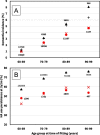Dementia and hearing-aid use: a two-way street
- PMID: 36571777
- PMCID: PMC9792081
- DOI: 10.1093/ageing/afac266
Dementia and hearing-aid use: a two-way street
Abstract
Objectives: Hearing-aid use may reduce risk of dementia, but cognitive impairment makes use more challenging. An observed association between reduced hearing-aid use and incident dementia could reflect either or both of these causal paths. The objective was to examine the effects of each path while minimising contamination between paths.
Methods: Health records data from 380,794 Veterans who obtained hearing aids from the US Veterans Affairs healthcare system were analysed. Analysis 1 (n = 72,180) used multivariable logistic regression to model the likelihood of incident dementia 3.5-5 years post hearing-aid fitting for patients free of dementia and mild cognitive impairment (MCI). Analysis 2 (n = 272,748) modelled the likelihood of being a persistent hearing-aid user at 3 years 2 months after fitting, contrasting subgroups by level of cognitive function at the time of fitting. Analysis time windows were optimized relative to dataset constraints. Models were controlled for available relevant predictors.
Results: The adjusted OR for incident dementia was 0.73 (95% CI 0.66-0.81) for persistent (versus non-persistent) hearing-aid users. The adjusted OR for hearing-aid use persistence was 0.46 (95% CI 0.43-0.48) in those with pre-existing dementia (versus those remaining free of MCI and dementia).
Conclusion: Substantial independent associations are observed in both directions, suggesting that hearing-aid use decreases risk of dementia and that better cognitive function predisposes towards persistent use. Research studying protective effects of hearing-aid use against dementia needs to account for cognitive status. Clinically, hearing devices and hearing care processes must be accessible and usable for all, regardless of their cognitive status.
Keywords: causality; dementia; hearing aid; older people; persistence.
© The Author(s) 2022. Published by Oxford University Press on behalf of the British Geriatrics Society.
Figures


 and
and  , persistent;
, persistent;  and
and  , non-persistent hearing-aid users at 3.5 years post fitting. (B): Hearing-aid use persistence at 3 years 2 months post hearing-aid fitting for 272,748 patients. Adjusted model datapoints were obtained by assigning each patient their probability of hearing-aid use persistence predicted by the model, then averaging in each patient age group.
, non-persistent hearing-aid users at 3.5 years post fitting. (B): Hearing-aid use persistence at 3 years 2 months post hearing-aid fitting for 272,748 patients. Adjusted model datapoints were obtained by assigning each patient their probability of hearing-aid use persistence predicted by the model, then averaging in each patient age group.  and
and  , prevalent-dementia group (prevalent dementia at time of hearing-aid fitting);
, prevalent-dementia group (prevalent dementia at time of hearing-aid fitting);  and
and  , high-functioning group (no dementia or MCI at any time up to 31 December 2017).
, high-functioning group (no dementia or MCI at any time up to 31 December 2017).Similar articles
-
Hearing intervention for decreasing risk of developing dementia in elders with mild cognitive impairment: study protocol of a multicenter randomized controlled trial for Chinese Hearing Solution for Improvement of Cognition in Elders (CHOICE).Trials. 2023 Nov 28;24(1):767. doi: 10.1186/s13063-023-07813-z. Trials. 2023. PMID: 38017543 Free PMC article.
-
Examining the Combined Estimated Effects of Hearing Loss and Depressive Symptoms on Risk of Cognitive Decline and Incident Dementia.J Gerontol B Psychol Sci Soc Sci. 2022 May 5;77(5):839-849. doi: 10.1093/geronb/gbab194. J Gerontol B Psychol Sci Soc Sci. 2022. PMID: 34655295 Free PMC article.
-
Hearing Loss and Risk of Mild Cognitive Impairment and Dementia: Findings from the Singapore Longitudinal Ageing Study.Dement Geriatr Cogn Disord. 2017;43(5-6):259-268. doi: 10.1159/000464281. Epub 2017 Apr 19. Dement Geriatr Cogn Disord. 2017. PMID: 28420004
-
Association of Hearing Aids and Cochlear Implants With Cognitive Decline and Dementia: A Systematic Review and Meta-analysis.JAMA Neurol. 2023 Feb 1;80(2):134-141. doi: 10.1001/jamaneurol.2022.4427. JAMA Neurol. 2023. PMID: 36469314 Free PMC article.
-
Adult-onset hearing loss and incident cognitive impairment and dementia - A systematic review and meta-analysis of cohort studies.Ageing Res Rev. 2024 Jul;98:102346. doi: 10.1016/j.arr.2024.102346. Epub 2024 May 23. Ageing Res Rev. 2024. PMID: 38788800
Cited by
-
Interactive effects of hearing aid use and cognitive function in patients with hearing loss.Psychogeriatrics. 2024 May;24(3):655-664. doi: 10.1111/psyg.13119. Epub 2024 Mar 25. Psychogeriatrics. 2024. PMID: 38528710 Free PMC article.
-
Factors Associated With Longitudinal Patterns of Hearing Aid Use.Innov Aging. 2024 Feb 9;8(2):igae011. doi: 10.1093/geroni/igae011. eCollection 2024. Innov Aging. 2024. PMID: 38496828 Free PMC article.
-
Comparative Effectiveness of Personal Sound Amplification Products Versus Hearing Aids for Unilateral Hearing Loss: A Prospective Randomized Crossover Trial.J Korean Med Sci. 2024 Jun 17;39(23):e179. doi: 10.3346/jkms.2024.39.e179. J Korean Med Sci. 2024. PMID: 38887200 Free PMC article. Clinical Trial.
-
Hearing loss, hearing aid use, and performance on the Montreal cognitive assessment (MoCA): findings from the HUNT study in Norway.Front Neurosci. 2024 Jan 8;17:1327759. doi: 10.3389/fnins.2023.1327759. eCollection 2023. Front Neurosci. 2024. PMID: 38260012 Free PMC article.
-
Characterisation of the treatment provided for children with unilateral hearing loss.Front Pediatr. 2023 Jul 25;11:1197713. doi: 10.3389/fped.2023.1197713. eCollection 2023. Front Pediatr. 2023. PMID: 37559951 Free PMC article.
References
-
- Pérès K, Helmer C, Amieva Het al. . Natural history of decline in instrumental activities of daily living performance over the 10 years preceding the clinical diagnosis of dementia: a prospective population-based study. J Am Geriatr Soc 2008; 56: 37–44. - PubMed
-
- Baltes PB, Lindenberger U. Emergence of a powerful connection between sensory and cognitive functions across the adult life span: a new window to the study of cognitive aging? Psychol Aging 1997; 12: 12–21. - PubMed
Publication types
MeSH terms
Grants and funding
LinkOut - more resources
Full Text Sources
Medical

